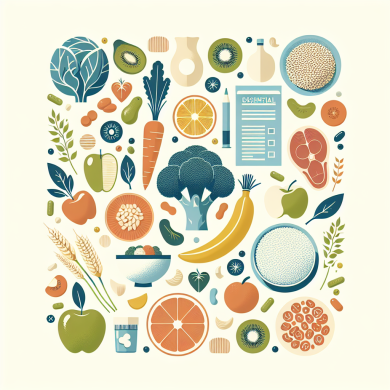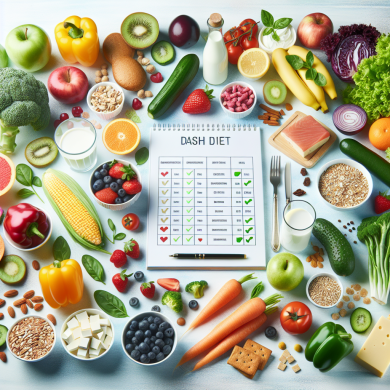DASH Diet: Boosting Kidney Health Naturally
Introduction to the DASH Diet
The Dietary Approaches to Stop Hypertension, commonly known as the DASH diet, is a dietary pattern that has been extensively studied and recommended by health professionals for its ability to lower blood pressure and improve overall health. Originally designed to combat hypertension, the DASH diet emphasizes the consumption of fruits, vegetables, whole grains, lean proteins, and low-fat dairy while reducing the intake of sodium, red meat, sweets, and added sugars. Beyond its cardiovascular benefits, emerging research suggests that the DASH diet may also play a significant role in supporting kidney health.
Understanding Kidney Health
The kidneys are vital organs responsible for filtering waste products and excess fluids from the blood, maintaining a balance of electrolytes, and regulating blood pressure. Chronic kidney disease (CKD) is a progressive condition characterized by the gradual loss of kidney function over time. Factors such as diabetes, hypertension, and obesity are major contributors to the development of CKD. Given the critical functions of the kidneys, maintaining their health is essential for overall well-being.
The Connection Between Diet and Kidney Health
Diet plays a crucial role in the management and prevention of kidney disease. A poor diet high in sodium, unhealthy fats, and processed foods can exacerbate kidney damage and increase the risk of CKD. Conversely, a nutrient-rich diet that is low in sodium and contains plenty of fruits and vegetables can help maintain kidney function and prevent further damage. This is where the DASH diet comes into play, offering a natural and balanced approach to supporting kidney health.
The DASH Diet Principles
The DASH diet is characterized by several key principles that contribute to its health benefits:
1. Emphasis on Fruits and Vegetables
Fruits and vegetables are rich in essential vitamins, minerals, and antioxidants that support overall health. They are also low in sodium and high in potassium, which helps counterbalance the effects of sodium on blood pressure. A diet high in fruits and vegetables can help reduce inflammation and oxidative stress, both of which are linked to kidney damage.
2. Whole Grains and Lean Proteins
The DASH diet encourages the consumption of whole grains, such as brown rice, oats, and quinoa, which provide fiber and essential nutrients. Lean proteins, including poultry, fish, beans, and nuts, are recommended over red and processed meats. These choices help maintain healthy blood pressure levels and reduce the burden on the kidneys.
3. Reduced Sodium Intake
One of the primary features of the DASH diet is its emphasis on reducing sodium intake. Excessive sodium can lead to high blood pressure, a major risk factor for kidney disease. By limiting processed and packaged foods, and opting for herbs and spices instead of salt, individuals can effectively lower their sodium intake.
4. Low-Fat Dairy
Incorporating low-fat dairy products, such as milk, yogurt, and cheese, provides a source of calcium and vitamin D, which are important for bone health and may have protective effects on the kidneys.
Benefits of the DASH Diet for Kidney Health
Adopting the DASH diet can offer several benefits for individuals seeking to improve or maintain their kidney health:
1. Blood Pressure Control
High blood pressure is a leading cause of kidney disease. The DASH diet’s emphasis on foods rich in potassium, magnesium, and calcium can help lower blood pressure, reducing the strain on the kidneys and slowing the progression of kidney damage.
2. Reduction of Inflammation
Chronic inflammation is a contributing factor to the development and progression of kidney disease. The antioxidants and anti-inflammatory compounds found in fruits, vegetables, and whole grains can help reduce inflammation and protect kidney function.
3. Improved Lipid Profile
The DASH diet’s focus on healthy fats, such as those found in nuts, seeds, and fish, can improve cholesterol levels and reduce the risk of atherosclerosis, a condition that can impair kidney function.
4. Weight Management
Obesity is a risk factor for both hypertension and kidney disease. The DASH diet promotes a balanced approach to eating, which can aid in weight loss and weight maintenance, reducing the risk of kidney damage.
Implementing the DASH Diet for Kidney Health
For individuals looking to adopt the DASH diet to support their kidney health, the following tips can be helpful:
1. Start Gradually
Transitioning to the DASH diet can be easier if done gradually. Begin by incorporating more fruits and vegetables into meals and reducing the intake of processed foods.
2. Plan Meals Ahead
Planning meals in advance can help ensure a balanced diet and reduce the temptation to rely on fast food or unhealthy snacks.
3. Be Mindful of Portion Sizes
Paying attention to portion sizes can help manage calorie intake and prevent overeating, supporting weight management and kidney health.
4. Stay Hydrated
Maintaining proper hydration is important for kidney function. Choose water and other low-calorie beverages over sugary drinks.
Potential Challenges and Considerations
While the DASH diet offers numerous benefits, there are potential challenges and considerations that individuals should be aware of:
1. Individual Dietary Needs
Individuals with advanced kidney disease may need to modify the DASH diet to meet their specific dietary needs, such as limiting potassium or phosphorus intake. Consulting with a healthcare professional or registered dietitian is recommended.
2. Adherence to the Diet
Like any dietary change, adherence to the DASH diet can be challenging. Finding ways to incorporate favorite foods and flavors within the diet’s guidelines can help improve compliance.
3. Cost Considerations
Purchasing fresh fruits, vegetables, and lean proteins can be more expensive than processed foods. Budgeting and planning can help manage costs.
Conclusion
The DASH diet is a well-researched and effective approach for promoting kidney health naturally. By emphasizing nutrient-rich foods and reducing sodium intake, the DASH diet can help manage blood pressure, reduce inflammation, and support overall kidney function. For individuals with or at risk for kidney disease, adopting the DASH diet, with appropriate modifications if necessary, can be a valuable step toward maintaining kidney health and improving quality of life. As always, it is important to consult with healthcare professionals to tailor dietary recommendations to individual needs and conditions.















Add comment